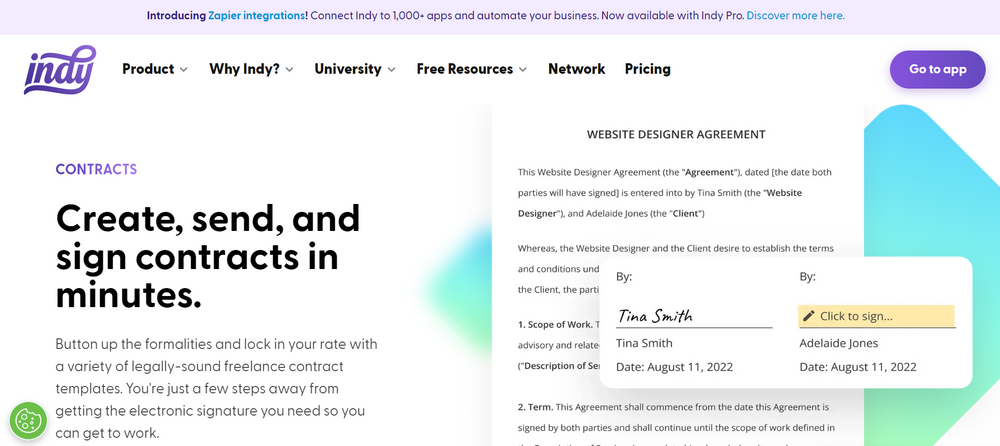All contracts consist of a series of terms that detail important information for all parties involved in the agreement, such as payment, deadlines, compensations (should there be a breach), termination, and more.
All legally binding contracts are crafted differently, but they will all contain certain provisions. In this article, we will go through the definition of contract terms and cover everything you need to know about standard (or boilerplate) terms and those that are specific to certain agreements. We will also explore the different types of clauses, why they matter, and what happens if anyone is found in breach of them. So, let's get started!
What are contract clauses or contract terms?
Business contracts are essential for the correct functioning of a company or professional endeavor. Generally speaking, when we talk about contract terms, we refer to a series of provisions that detail how contractual obligations will work for a particular work relationship.
No contract will be the same as another. Some are lengthy (in some cases, they can be hundreds of pages!), and others are more to the point, but they all include terms and conditions that establish each involved party's obligations and responsibilities.
The contract terms bind parties by law and are designed to protect their interests. They include provisions for things like fees, deadlines, and compensations. That's why, if any clauses are breached, this can lead to litigation. But don't worry, we'll cover this in more detail soon. Let's start, though, by reviewing the different and most popular types of contract terms and how they are used within an agreement.
Types of contract terms – classification
Standard commercial contracts tend to use the same terms, albeit with specific references to the work that will be conducted or what the parties agree to.
Before we continue exploring the elements that make up a contract, we should mention that there is a small difference between clauses and terms. Basically, clauses are the components that make up the contract. In short, the blocks of text that explain all the parts in detail.
Terms are designed to protect the parties' best interests and can typically be divided into three broad categories: Conditions, warranties, and innominate terms.

Let's take a look at these.
- Conditions: Condition contract clauses define things that need to be followed. A condition contract term is of vital importance, as it constitutes the root of a transaction. If one is breached, then the claimant has a right to terminate the contract and can potentially claim damages for any relevant losses. Conditions can be divided into two types, too:
- Expressed conditions: Ones that have been clearly described and are agreed upon by all parties involved (either in writing or orally).
- Implied conditions: Terms that are assumed to be accepted by all without further description required. For example, that purchased goods will not be damaged or that a product name can constitute an account (for instance, that a table is a table and cannot be interpreted as a desk). Implied terms also have a sub-division, as they can be implied by a court or by statute.
- Warranties: Warranty terms are akin to promises. They allow an acting party to claim damages if there is a contract breach, but not to terminate the contract. If a warranty is considered extremely important, it can instead be classified as a condition (provided all parties agree). Usually, however, these terms are statements of facts. For example, a warranty clause can say that a contractor will commit to delivering services in a workmanlike manner consistent with trade and industry standards.
- Innominate terms: Innominate clauses cannot be defined as either a condition or a warranty. Another word for these is "intermediate." Basically, a term is innominate if it's not clear whether it's one of the two types mentioned above. For these clauses, the remedy for a possible breach will depend on its nature and consequences. So, you could have the right to terminate the contract or sue for damages.
Common contract terms and clauses and what they mean
Everyone doing business should use a contract, so it's natural a lot of these terms have become commonplace. In this section, we will go through the different terms and explain how they are used.
Termination clause
All contracts will contain a termination clause stating the circumstances in which a party can terminate the agreement. Parties can avoid disputes by allowing this term to trigger for specific allowed reasons. For example, if it becomes impossible to perform tasks due to unforeseen circumstances, someone doesn't perform their duties, or all responsibilities are fulfilled successfully. Termination clauses are very common in employment contracts, as they define which misconduct can lead to an employee being let go.
Force Majeure clause
This clause translates to "greater force," and its purpose is to protect parties from failing their duties when there are circumstances beyond their control. For example, when natural disasters or hostilities occur. Recently, the Covid-19 pandemic triggered several of these clauses in contracts all around the world! The aim of this term is to make it clear where the risk of non-performing sits, and it's an essential component for anyone entering an agreement.
Confidentiality clause
Most companies entering a contract will have to be open to sharing information with all the parties involved. Because this information can be sensitive, most agreements include a clause that is designed to preserve confidentiality. This is typically also referred to as an NDA or Non-Disclosure Agreement and, in some cases, can constitute an entirely independent document that deals with the handling of a trade secret, patent, or client data.
Most commercial contracts will have this as a clause. There are two types of confidentiality clauses. In a one-way term, the information will be confidential for the receiving party alone, but the duties will not be mirrored. In a mutual confidentiality term, everyone owes the others the same duty to keep certain things secret.
Dispute and Arbitration clause
No matter how solid and well-written a contract is, there can always be disputes between the involved parties. This term specifies what happens when one arises; the steps for resolving them. When drafting this term, the first thing you will need to decide on is the forum. The dispute clause typically includes provisions for arbitration, reference to litigation through the courts, and mediation. You can choose one of these or combine them to take advantage of the different mediums.
Damages clause
If either party (or any party if there are more than two) is found in breach of contract clauses, then the innocent one can be awarded damages. Or rather, they will be entitled to request compensation if there is a failure to perform a task or comply with an obligation or duty. In some cases, parties need to negotiate a liquidated provision to determine the actual value of the services and the damages attached to them.

Payment terms
A contract's payment terms set out the details of how you will be paid for your work as a contractor. There will be some differences within this clause depending if you're working independently or through an agency. For example, you might specify that you will send your invoices directly to the client or go through a separate entity. Payment contract terms cover things like fees and charges, how often you will send invoices, what proof (if any) you will require, how the billing will work, and the timeframe for payments.
Term of License Agreement clause
This term, also known as license rights, refers to information being subjected to the conditions of public license, copyright, and similar, that you will use for your materials. The term typically gives the Licensor the "authority to license," allowing them to produce and sell goods, use patented technology, or apply a trademark or brand name. For example, a Licensed Rights clause could specify how computer software (whose copyright is owned by holders) can be used by a company for its daily operations.
Other clauses
Depending on the type of contract you will use for your work relationship, you might come across clauses and terms like the following:
- Jurisdiction and governing law: This clause can define which court will cover a potential dispute if there is a breach of contract. Also, which legal system will apply; for example, depending on the state where you will carry out the work.
- Term: This clause can define how long the contract will last. Most people will limit this duration exclusively to what's required by the tasks.
- Parties' obligations: This clause determines each of the parties' obligations. For example, who will do what, and what happens if anyone involved fails to perform their duty.
- DGPR clauses: This can specify that you are complying with GDPR and other necessary data protection regulations. The related terms should typically also include a mention that you will accept legislation changes as well.
What happens if you breach a contract clause?
If you can no longer comply with the terms of a legally binding contract, then you could be in breach of it. The innocent party, in this case, can have a right to obtain compensation for their loss – typically as damages.
In short: A party will be in breach of a contract if they fail to perform the conditions, warranties, or innominate terms they promised to fulfill.
There are three types of common contract breaches. These are:
- Delayed performance: A party does not perform their duties on time and in accordance with the contract clauses.
- Defective performance: A party performs a duty but not to the standards that were specified in the agreement.
- Complete non-performance: A party does not perform its responsibilities at all.
In order to sue for a breach of contract, you will have to set out the particular of the claim and prove the facts that prove the agreement was broken. Then, you will be able to claim a balance of possibilities to obtain a remedy for your loss.

The typical remedies are a right to monetary compensation, specific performance of the contract (or an injunction to prevent the party from further breaching the agreement), or the right to terminate the contract.
Using contract templates with legally sound clauses
If you want to make sure your contract is legally sound and contains all the crucial clauses for a satisfactory relationship, an excellent option is to use a contract template.
Indy has a series of free contract templates, all tailored to specific industries and areas. The platform, which also includes eight other tools ideal for freelancers and small businesses, makes creating and sending contracts really easy.

All you need to do is select an agreement based on your profession and customize it with your and your client's information. You can also personalize all the contract's components, such as:
- Payment terms
- Termination terms
- Proprietary information details
- Liability and indemnification
- Severability
- Arbitration
- And much more!
Indy is a one-stop shop designed to help you save time and money by streamlining all of your business contracts, invoices, proposals, messages, and tasks. It also includes powerful integrations with Zapier, Google Calendar, Paypal, and Stripe.
There are two plans available: A Free Forever plan, which includes unlimited access to Indy's core tools like projects, tasks, forms, calendars, time tracker, and file storage for up to 10GB. Plus, you'll get 3 proposals, contracts, and invoices a month.
For unlimited proposals, contracts, and invoices, plus powerful integrations, workflow automations, white labeling, custom branding, and live chat support, you can sign up for Indy Pro for just $9/month with the annual plan.
Conclusion
Time to wrap up! In this article, we reviewed what contract clauses and terms are and why they are essential, and we covered the most common ones used in agreements all around the world. We also went through the different types of terms and explained essential clauses like termination, force majeure, confidentiality, dispute, damages, and payment. Lastly, we saw what would happen if a party is found in breach of contract.
If you want to make sure your contract is legally sound and covers you for any eventuality, you should consider using a contract template that already includes the correct phrasing for all the vital clauses and terms you will need during a project. By using Indy, you will be able to simply pick a contract template and customize it to your liking, connecting it to a suite of powerful tools that can help you grow your business with confidence.



